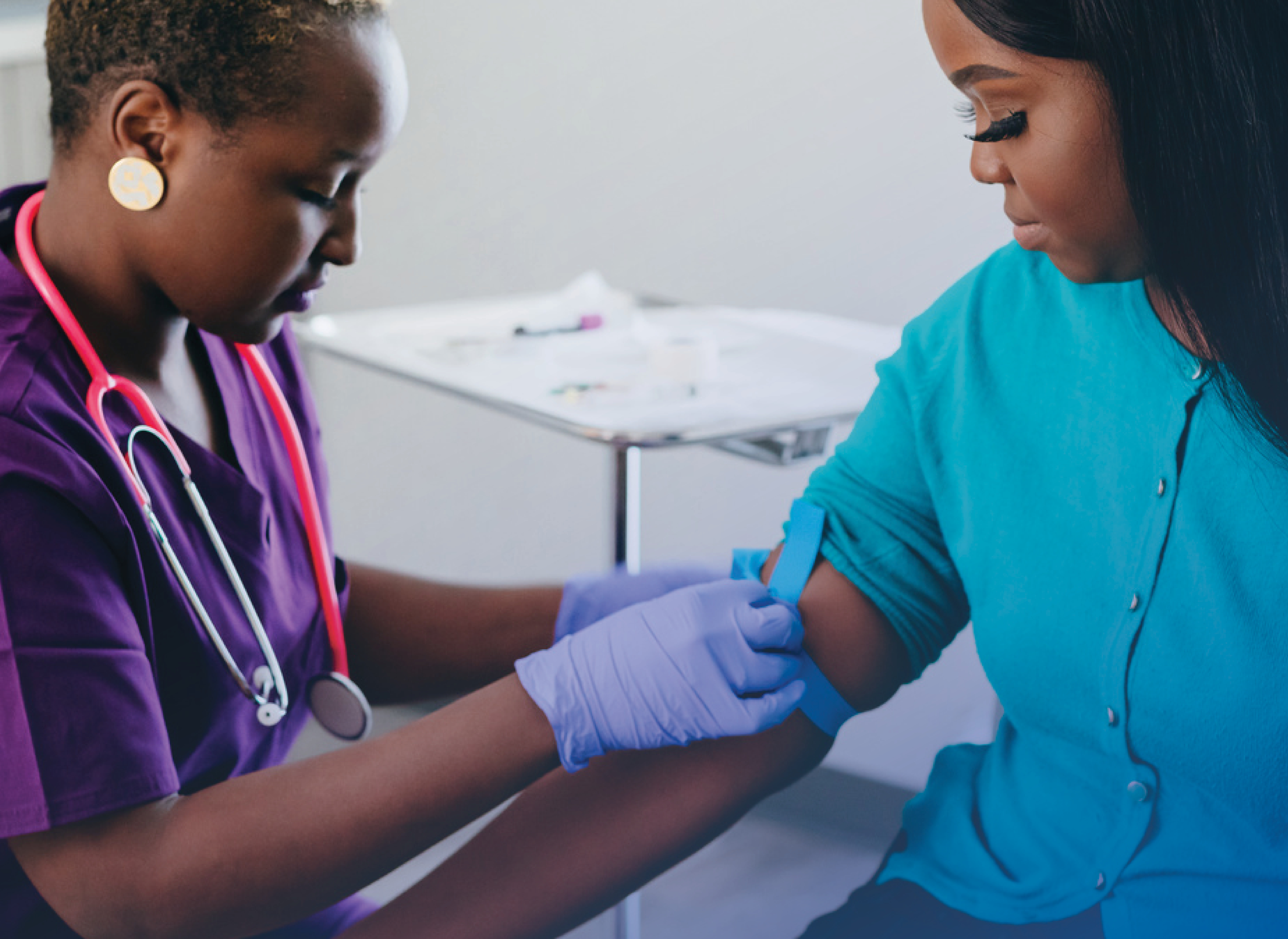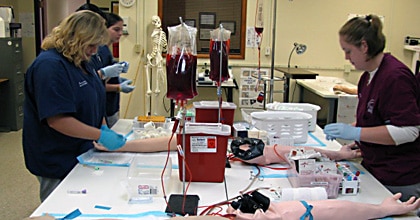Phlebotomy school: Where This Certificate Can Take You
Phlebotomy school: Where This Certificate Can Take You
Blog Article
The Course to Certification: Recognizing the Phlebotomy Educating Training Course Journey and Its Significance
As you think about the course to certification in phlebotomy, it is necessary to recognize the function you'll play in medical care. Your training will certainly cover essential skills, from blood collection techniques to patient communication. Each element of the program prepares you for the challenges in advance. What specifically does the journey entail, and why is qualification so important for your future profession? Allow's check out these questions better.

The Duty of Phlebotomists in Health Care
Phlebotomists play an essential role in the medical care system, working as the vital web link in between clients and vital analysis testing. You'll execute blood draws, making certain samples are accumulated properly and safely. Your know-how helps in diagnosing clinical problems, monitoring health, and assisting therapy decisions.
In your everyday interactions, you'll require to establish trust fund with patients, making them feel comfortable throughout what may be a difficult experience. You're liable for classifying and handling examples very carefully to stop contamination or errors, which could influence examination outcomes.
Beyond this, you'll typically work alongside doctors and registered nurses, interacting important information about patients' problems. By understanding your abilities, you add meaningfully to patient care, making you an important component of the clinical team.
Overview of Phlebotomy Training Programs
When checking out phlebotomy training programs, you'll discover numerous types made to fit various routines and learning designs. Each program assists you establish important skills like blood collection and individual communication. Understanding these options is crucial to selecting the right course for your career.
Kinds Of Training Programs
Several kinds of training programs are offered for those looking to come to be proficient in phlebotomy. In addition, some medical facilities and facilities offer on-the-job training programs, providing functional experience while you learn. Whatever course you select, each program aims to equip you with the necessary abilities for an effective phlebotomy profession.

Secret Abilities Created
Understanding phlebotomy requires a set of vital skills that are established with detailed training programs. Furthermore, interaction abilities are basic; you'll need to engage with people, explain procedures, and placed them at convenience. Each of these abilities is crucial for your success as a certified phlebotomist, making you a valuable asset in any type of healthcare setup.
Secret Parts of a Phlebotomy Program
In a phlebotomy course, you'll concentrate on essential subjects that lay the foundation for your future job. You'll participate in hands-on training that permits you to apply what you have actually found out in real-world setups. Both the core educational program and practical experience are essential for your success as a phlebotomist.
Curriculum Introduction
While pursuing a phlebotomy training program, you'll run into a curriculum developed to outfit you with fundamental abilities and understanding. Phlebotomy school. This educational program generally includes composition and physiology, concentrating on the blood circulation system and comprehending blood elements. You'll additionally learn more about different kinds of blood collection approaches, including venipuncture and capillary leak techniques
Furthermore, infection control and security protocols are essential parts, ensuring you recognize exactly how to preserve a sterile atmosphere. You'll examine patient communication, emphasizing interaction and compassion, which are vital for reducing person stress and anxiety. Ultimately, honest and lawful considerations will certainly be dealt with, preparing you for real-world duties. This foundational expertise will allow you to stand out as a phlebotomist and supply quality care in professional setups.
Hands-On Training Experience
Obtaining hands-on experience is a vital part of your phlebotomy training program. This useful training enables you to use what you have actually learned in a real-world setting, improving your skills and confidence. Phlebotomy Courses Near Me.
Furthermore, you'll get the opportunity to engage with individuals, which is crucial for developing your communication skills. This combination of technological efficiency and interpersonal abilities is essential for your success as a licensed phlebotomist. Inevitably, hands-on training is where concept meets practice, solidifying your understanding and readiness for qualification.
Qualification and Licensing Demands
Prior to you can begin your job in phlebotomy, it is crucial to comprehend the accreditation and licensing requirements that differ by state. Most states call for phlebotomists to hold an accreditation from a recognized company, such as the National Phlebotomy Association or the American Culture for Medical Pathology. These accreditations normally entail passing an exam that tests your expertise and skills in the area.
Along with accreditation, some states have certain licensing demands. You might require to finish a specific number of hours in professional practice, submit evidence of training, or undergo a history check. It is crucial to investigate your state's regulations to ensure you fulfill all essential criteria.
Staying notified regarding these needs not only assists you safeguard a setting but likewise enhances your reliability as a specialist. By satisfying these demands, you'll be well on your way to an effective job in phlebotomy.
Hands-On Training and Practical Experience
Hands-on training and useful experience are vital elements of your phlebotomy education and learning, as they permit you to use theoretical expertise in real-world Phlebotomy Courses Near Me scenarios. During your training, you'll participate in supervised venipuncture, learn appropriate techniques, and end up being accustomed to various blood collection devices. This straight involvement is vital for building your self-confidence and honing your skills.
You'll function carefully with seasoned professionals that can guide you with the nuances of individual communication and example handling. Each practice session not only reinforces your understanding however also prepares you for the busy atmosphere of medical care settings.
In addition, numerous programs include clinical turnings, allowing you to experience varied setups, from health centers to outpatient clinics. This exposure aids you adapt to different difficulties and individual requirements, ensuring you're well-prepared for your future duty. Welcome these opportunities, as they're necessary to ending up being a proficient and thoughtful phlebotomist.
Challenges Encountered Throughout Training
While obtaining hands-on experience is important, it's important to identify the challenges that can develop throughout your phlebotomy training. In addition, mastering the skills required for blood attracts takes method; you might battle with strategy initially.
Time administration can additionally be an obstacle, as harmonizing concept, functional sessions, and individual dedications can really feel daunting. You might encounter differing finding out rates amongst your peers, bring about sensations of insecurity if you assume you're dropping behind. Ultimately, adjusting to the various personalities of instructors can be challenging, as each may have a distinct teaching style.
Acknowledging these challenges early can prepare you for success and assist you develop strength throughout your training journey.
Profession Opportunities After Accreditation

As you get experience, you might also consider focusing on locations like pediatric or geriatric phlebotomy, providing to particular person needs. Some phlebotomists select to progress their jobs by ending up being lab professionals or going after further education and learning in healthcare areas.
Additionally, your qualification can result in functions in training or supervising new phlebotomists, enabling you to share your expertise. With the healthcare market consistently growing, your skills will certainly always remain in need, paving the method for a steady and meeting career. Accept the chances waiting for you!
Often Asked Inquiries
What Is the Regular Duration of a Phlebotomy Educating Program?
Phlebotomy training programs generally last around four to eight weeks. You'll involve in hands-on practice, classroom direction, and on the internet learning. Completing this training prepares you for qualification and a satisfying job in healthcare.
Are Online Phlebotomy Courses Available?
Yes, on the internet phlebotomy programs are readily available. They supply versatility and benefit, allowing you to examine at your own speed. Just verify the program is certified to satisfy accreditation requirements and acquire useful skills for your occupation.
Just How Much Does Phlebotomy Training Usually Expense?
Phlebotomy training commonly costs between $700 and $2,500, depending on the program and area. You need to take into consideration aspects like program length, consisted of materials, and hands-on experience when choosing the right training for you.
What Prevail Requirements for Phlebotomy Training?
Usual requirements for phlebotomy training usually include a high school diploma or GED, booster shots, and a history check. Some programs may additionally require standard healthcare knowledge or accreditations, ensuring you're prepared for hands-on training.
Can I Function While Completing My Phlebotomy Training?
Yes, you can function while finishing your phlebotomy training. Lots of trainees balance jobs with their researches, but make sure to manage your time efficiently to guarantee you fulfill both work and training commitments efficiently.
Report this page